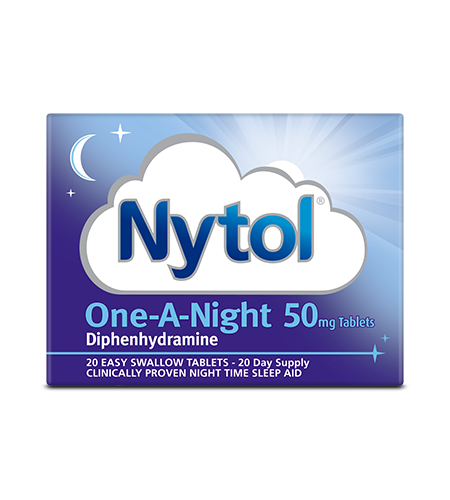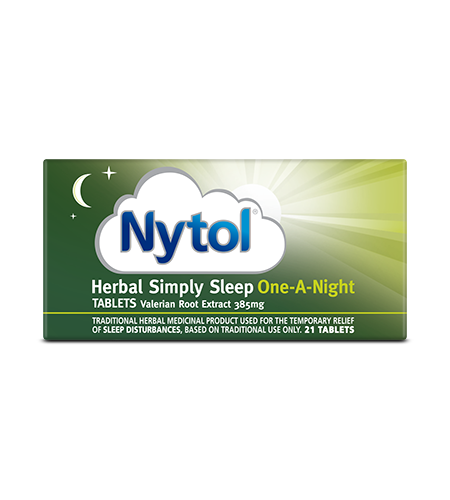
Helping customers manage short-term sleep problems
A quick guide to the science of sleep and how OTC sleep aids work.
Learning outcomes
- Understand the normal sleep process and what happens when it is disrupted
- Learn how different OTC sleep aids work
- Feel confident about recommending OTC sleep aids
Sleep, science and support
Sleep disruption is a common problem
With the world having become a more uncertain place recently, difficulty getting to sleep is reported to be more common than ever2, it is estimated to affect 1 in 3 people in the UK at some point.1
It’s important to talk to your customers about their sleep issues, therefore it’s vital your team have a solid understanding of the physiological processes involved in sleep.

The basal forebrain
releases the chemical adenosine to support the body’s biological need for sleep.3

The hypothalamus
matches the body’s circadian rhythm to the natural light-dark cycle, helping us sleep when it is dark and stay awake when it is day.3 The histaminergic system is in the hypothalamus. Histamine has a pivotal role in regulating sleep-wakefulness.4

The brain stem
communicates with the hypothalamus to control transitions between wake and sleep. The chemical GABA is produced to reduce arousal in the hypothalamus and brain stem. The brain stem sends signals to relax muscles for posture and limb movements when we sleep.3

The pineal gland
increases production of the hormone melatonin when it gets dark, to help us sleep.3

The thalamus
transmits information from our senses to the cerebral cortex in the brain. It becomes quiet during most of sleep, so we can tune out the external world. It is active during REM sleep, when we dream.3
Impact of sleep distrubtion
Symptoms of disrupted sleep include:
- irritability
- memory problems
- reduced attention span
- trouble planning
- difficulty finding words
- reduced sense of time
- delayed responses
- impaired judgement
Seeing more people in pharmacy with sleep problems recently?
Pharmacy can help take the pressure off the NHS by assisting customers with short-term sleep problems. If these can be dealt with using OTC sleep aids, customers may not need to consult their GP.
There is a wide choice of OTC sleep aid options. Here’s what to know when recommending:

WHO is the patient?
- Over 18? (OTC sleep aid products are generally recommended for people age 16+)
- Are taking tablets a problem?

WHAT is the nature of their sleep problem?
- Are they experiencing increased stress or a recent change of circumstances?
- Are they having difficulty getting to sleep / staying asleep, or both?

HOW long have they been experiencing sleep problems?
- When did the problem start?
- Is it affecting their personal or work life, eg. mood / ability to concentrate?

What ACTIONS have they taken?
- Have they tried changing their sleep routine?
- Have they tried a herbal OTC sleep aid?
- Have they tried an OTC diphenhydramine-based sleep aid?

Are they taking any other MEDICINES?
- Are any of the OTC sleep aids contraindicated?
- Are they taking any medicines containing diphenhydramine, valerian root extract, hops or passion flower for any other reason?
Look out for customers who...
Have sleep problems for the first time
- Experiencing stress-related sleep disruption
- They will need help in understanding the OTC sleep aids available
Work night shifts
- An increasing demographic that will need short term support
- They will be more familiar with the range of OTC sleep aids on offer
Recommending OTC sleep aids
Consider Diphenhydramine (a sedating antihistamine) or natural actives when recommending sleep aids
Diphenhydramine
- Commonly used – clinically proven to aid sleep7
- Histamine levels are raised when we are awake and lowered when we are asleep4
- Diphenhydramine blocks the effects of histamine, usually causing drowsiness7
Natural actives
- Valerian root extract – widely used for inducing sleep and improving sleep quality8
- Passion flower is used to treat anxiety9
- Hops have been used to treat anxiety
and sleep problems9
AN ALTERNATIVE TO SLEEPING TABLETS
Think Nytol Liquid Caramel Flavour for customers who:

Find tablets difficult to swallow
The Liquid Caramel Flavour solution makes it easy for customers who have difficulty swallowing tablets10 to benefit from clinically proven Nytol.

Are seeking an OTC sleep aid clinically proven to aid sleep
A commonly used antihistamine, diphenhydramine is the active ingredient in Nytol Liquid Caramel Flavour and is
clinically proven to aid sleep.

Want a product that can be taken when they need to sleep
Nytol Liquid Caramel Flavour can be taken at bedtime or after going to bed, if the customer finds that they are unable to sleep.

Are experiencing short-term sleep disruption
OTC sleep aids are designed to be used for a short period of time only. If sleep problems persist, customers should consult their GP.11

References
- NHS: Insomnia. Available at: https://www.nhs.uk/conditions/insomnia/
Accessed August 2020. - University of Oxford. Oxford researchers lead international study on effects of
COVID-19 on sleep. Available at: https://www.ox.ac.uk/news/2020-06-12-oxfordresearchers-
lead-international-study-effects-covid-19-sleep# Accessed August 2020. - National Institute of Neurological Disorders & Stroke. Brain Basics:
Understanding Sleep. Available at: https://www.ninds.nih.gov/Disorders/Patient-
Caregiver-Education/Understanding-Sleep Accessed August 2020. - Thakkar, MM. Histamine in the regulation of wakefulness. Sleep Med Rev 2011.15(1):
65-74. Available at: https://www.ncbi.nlm.nih.gov/pmc/articles/PMC3016451/
Accessed August 2020. - BBC: The science of sleep. Available at: https://www.bbc.co.uk/science/humanbody/
sleep/articles/whatissleep.shtml Accessed August 2020. - TUC: Number of people working night shifts up by more than 150,000 in 5 years.
Available at: https://www.tuc.org.uk/news/number-people-working-night-shiftsmore-
150000-5-years Accessed August 2020. - NHS: Diphenhydramine including Nytol Original. Available at:
https://www.nhs.uk/medicines/diphenhydramine/ Accessed August 2020. - Bent S, et al. Valerian for Sleep: A Systematic Review and Meta-Analysis.
Am J Med 2006: 119(12):1005-1012. - Royal College of Psychiatrists. Complementary and alternative
medicines: herbal remedies. 2015. Available at:
https://www.rcpsych.ac.uk/mental-health/treatments-and-wellbeing/
complementary-and-alternative-medicines Accessed August 2020.


